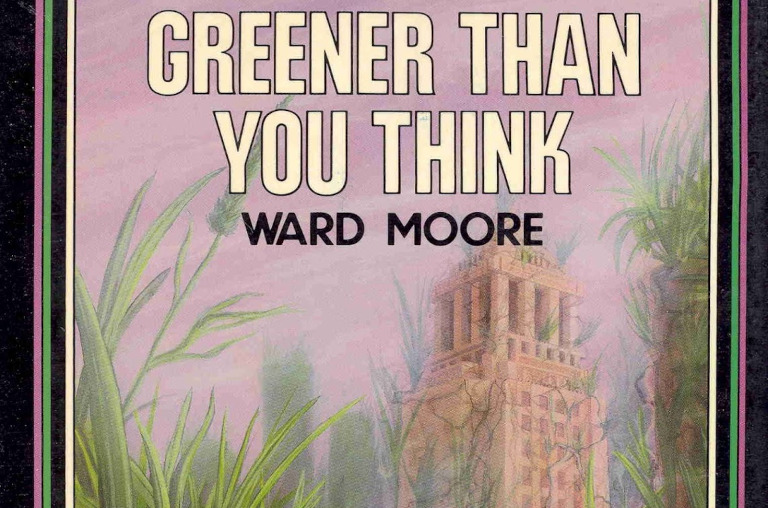 Greener Than You Think
Greener Than You Think
By Ward Moore
Original edition: William Sloane Associates, Inc., Jan. 1947, 358 pp.
Reissued in various print and ebook editions.
For a novel that came out three-quarters of a century ago, Ward Moore’s science fiction classic Greener Than You Think remains surprisingly accessible, relevant and enjoyable to this day. Its absurdist, darkly comedic rendering of a rather grim eco-disaster scenario—in which a mutant strain of Bermuda grass overruns the Earth and devastates its ecosystems—is just as bitingly satirical and funny now as it must have been in 1947.
The story takes place in Los Angeles and follows Josephine Spencer Francis and Albert Weener, the epitomes, respectively, of the brilliant but myopic scientist and the unscrupulous capitalist. Francis has developed a chemical called the Metamorphizer, which she is confident will revolutionize agriculture and solve world hunger by enabling plants to grow explosively. The enormous potential for unintended consequences that one would hope would have dissuaded her from pursuing such an invention never seemed to stop her from pushing ahead with it anyway.
Weener, our antipathic first-person narrator, is an opportunist who exploits the Metamorphizer for his own gain and, in the process, rises from two-bit salesman to the world’s wealthiest tycoon, at the cost of countless lives and most of the natural world. His astonishing ability to rationalize every ethical lapse along the way speaks to the dangers of unregulated corporate greed.
Weener and Francis first meet when he answers her vaguely worded ad for a high-paying sales opportunity. Entering her rundown apartment in the wrong part of Hollywood, he is taken aback by the woman before him, who resembles nothing so much as a female version of Doc Brown (the manically eccentric scientist from the Back to the Future movies) with her wide, intense eyes, unkempt hair and erratic gestures. “Think of what this discovery means,” she rhapsodizes to him. “Plants will be capable of making use of anything within reach. Understand, Weener, anything. Rocks, quartz, decomposed granite—anything.” She goes on to explain that the Metamorphizer alters plants’ cellular structure so that they can subsist on practically any form of matter.
Weener is skeptical but sees an opportunity to profit from selling the idea of the Metamorphizer rather than an actual working version of it. After a comical negotiation, he and Francis form a 50/50 partnership.
Weener begins peddling the Metamorphizer door-to-door as a “lawn tonic” and manages to convince one hapless homeowner to let him treat her lawn with it. However, due to flaws in both Francis’ formulation of the Metamorphizer and Weener’s application of it, the lawn quickly becomes an uncontrollable jungle, and all attempts to control it—whether by blades, fire, explosives or any other method of destruction—fail miserably. The peril and madcap comedy reach surreal heights as the grass grows 15 feet tall, swallows entire neighborhoods, overwhelms a battalion of military tanks, and even shrugs off a nuclear strike.
Over the next two decades, the grass plague becomes a global crisis. The novel vividly and fascinatingly explores the myriad ways in which its spread reshapes Earth, fundamentally altering both natural and human-made environments. As the grass destroys all manner of human-made infrastructure, transportation systems break down and essential resources like water, fuel and food become scarce, leading to disease outbreaks, economic collapse, famine and mass migrations. Cities become uninhabitable, barter replaces money, and people turn to religion and strongman leaders to maintain order.
Nightmarish new ecologies emerge as the grass wipes out most other species and pressures the survivors to grow to gigantic proportions, with worms reaching the size of snakes and insects the size of birds. Sea levels begin to plummet as seawater is drawn inland to feed the grass’s insatiable roots, leading experts to warn that all the planet’s oceans may eventually vanish.
Nonetheless, the world undergoes a creative renaissance for a time as humanity seeks solace in the arts. A novel titled Greener Than You Think (one wonders how its contents compare to those of the eponymous novel we’re reading) becomes a cultural touchstone, alongside symphonies, plays and films capturing the despair and absurdity of the crisis. But eventually, the scope of artistic expression becomes severely constrained as industrial society falls deeper into ruin, modern technologies fade, currencies lose value and first-world nations—starting with America—revert to agrarianism before ultimately ceasing to exist altogether.
Much of the comedy comes from Weener’s absurdly inflated ego and backwards way of rationalizing his actions as he claws his way to becoming the world’s most powerful man. Early in his partnership with Francis, he justifies misusing some of her money for his own personal expenses by reasoning that his willingness to do so shows how confident he is in her invention—he’s certain it will generate enough profit to offset his personal spending and then some. And upon realizing the Metamorphizer’s full potential, his first instinct is to lock Francis into a contract, a move he says is meant to protect her from exploitation, though we suspect his true motive is to be the one to exploit her.
Through a wildly improbable series of events befitting a satire of this magnitude, Weener rises to become the world’s largest food baron, gaining total control over industrial agriculture and thus coming to view himself as humanity’s savior. The lengths to which he’ll go to protect his monopoly and maximize profits are on full display during an especially revealing exchange with a corrupt general with whom he’s been secretly colluding. Weener suggests abandoning operations in regions affected by the mutant grass and, with the general’s assistance, toppling governments that attempt to seize control of the deserted assets. When the general, finally realizing this is a bridge too far, objects that it would bring about the collapse of civilization—and argues that Weener is wealthy enough to absorb the losses and prevent civilization’s collapse—Weener dismisses his concerns outright, attributing them to diminished intelligence on the part of this senior officer.
Another target of the novel’s satire is Weener’s misogyny. Of particular note is his repeated use of the phrase “her sex” (e.g., “Her refusal to accept the limitations of her sex”; “Undoubtedly much of her stubbornness was due to her sex”) to explain Francis’ supposed flaws. It seems that, in addition to automatically assuming that those who criticize him must be doing so because there’s something fundamentally wrong with them, Weener sees women as unflattering stereotypes rather than individuals. It’s clear, however, that the novel itself isn’t sexist—rather, we’re meant to deride Weener’s sexism and sympathize with Francis’ pointed rebuke of it, as for example when she rejects his patronizing use of the word “lady” to describe her: “Weener, you are ineffable. I’m not a lady—I’m a chemist.”
Beyond environmental exploitation, corporate greed and sexism, the novel deftly skewers a host of other societal ills, including rampant consumerism, media sensationalism, government and institutional incompetence, political grandstanding, misplaced faith in science and technology, the growing detachment of urban populations from nature, and the widespread tendency to turn to metaphysical woo woo in times of existential crisis.
As cartoonish as the mutant grass is in its explosive proliferation and near invincibility, an attempt is made to lend it a veneer of scientific credibility. By way of analogy, Francis explains to Weener that, just as amputating a man’s leg turns him into a one-legged creature with a completely new disposition, so making the grass omnivorous has given it a totally new nature—one characterized by an insatiable appetite. “If you give a man a big belly, you make him a hog,” she reasons.
With its brilliant blend of epic scope, dark comedy, goofiness, sharp irony and a multilayered, eerily prescient narrative, Greener Than You Think remains a wildly successful and thoroughly entertaining work of satire. Though it occasionally feels drawn out—due to its substantial page count and some digressions into narrative threads unrelated to the central threat—it remains consistently engaging.






